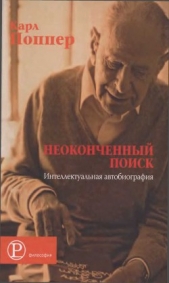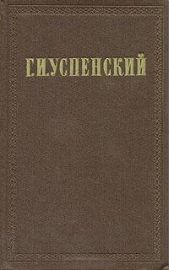Неоконченный поиск. Интеллектуальная автобиография

Неоконченный поиск. Интеллектуальная автобиография читать книгу онлайн
Предлагаемая вниманию читателей книга представляет собой философскую автобиографию Карла Раймунда Поппера (1902–1994), — крупнейшего философа науки и социального мыслителя XX века. Повествование автора об особенностях его интеллектуального становления и философской эволюции разворачивается на фоне масштабных событий XX века — первой мировой войны, межвоенного лихолетья 1920–1930 годов, вынужденной эмиграции и годов скитаний. Автор приоткрывает перед читателем вход в лабораторию своей мысли, показывает рождение своих главных философских концепций и идей через призму споров с коллегами, друзьями и оппонентами. Книга рассчитана на широкий круг читателей.
Внимание! Книга может содержать контент только для совершеннолетних. Для несовершеннолетних чтение данного контента СТРОГО ЗАПРЕЩЕНО! Если в книге присутствует наличие пропаганды ЛГБТ и другого, запрещенного контента - просьба написать на почту [email protected] для удаления материала
(a) «What is Dialectic?», Mind, 49, pp. 403–426.
(a) «The Poverty of Historicism, I», Economica,ll, pp. 86-103.
(b) «The Poverty of Historicism, II. A Criticism of Historicist Methods», Economica, 11, pp. 119–137.
(a) «The Poverty of Historicism, III», Economica, 12, pp. 69–89.
(b) The Open Society and Its Enemies, volume I, The Spell of Plato, George Routledge & Sons, Ltd., London.
(c) The Open Society and Its Enemies, volume II, The High Tide of Prophecy: Hegel, Marx, and The Aftermath, George Routledge & Sons Ltd., London.
(e) «Research and the University: A Statement by a Group of Teachers in the University of New Zealand», The Caxton Press (Christchurch, New Zealand); written in co-operation with R.S. Allan, J. C. Eccles, H. G. Forder, J. Packer, and H.N. Parton.
(b) «Why are the Calculuses of Logic and Arithmetic Applicable to Reality?», Aristotelian Society, Supplementary Volume XX: Logic and Reality, Harrison and Sons Ltd., London, pp. 40–60.
(a) «New Foundations for Logic», Mind, 56, pp. 193–235.
(b) «Logic Without Assumptions», Proceedingsof the Aristotelian Society, XLVII, pp. 251–292.
(c) «Functional Logic without Axioms or Primitive Rules of Inference», Koninklijke Nederlandsche Akademie van Wetenschappen, Proceedings of the Section of Sciences(Amsterdam),50, pp. 1214–1224, and Indagationes Mathematicae, 9, pp. 561–571.
(b) «On the Theory of Deduction, Part I, Derivation and its Generalizations». Koninklijke Nederlandsche Akademie van Wetenschappen, Proceedings of the Section of Sciences (Amsterdam), 51, pp. 173–183, and Indagationes Mathematicae, 10, pp. 44–54.
(c) «On the Theory of Deduction, Part II. The Definitions of Classical and Intuitionist Negation», Koninklijke Nederlandsche Akademie van Wetenschappen, Proceedings of the Section of Sciences(Amsterdam),51, pp. 322–331, and Indigationes Mathematicae, 10, pp. 111–120.
(d) «Prediction and Prophecy and their Significance for Social Theory», Library of the Tenth International Congress of Philosophy, 1: Proceedings of the Tenth International Congress of Philosophy, edited by E. W. Beth, H. J. Pos, and J. H. A. Hollak, North-Holland Publishing Company, Amsterdam, pp. 82–91.
(e) «The Trivialization of Mathematical Logic», ibid., pp. 722–727.
(f) «What can Logic do for Philosophy?» Aristotelian Society, Supplementary Volume XXII: Logical Positivism and Ethics, Harrison and Sons Ltd., London, pp. 141–154.
(d) «Naturgesetze und theoretische Systeme», Gesetz und Wirklichkeit, edited by Simon Moser, Tyrolia Verlag, Innsbruck and Vienna, pp. 43–60.
(a) The Open Society and Its Enemies, Princeton University Press.
(b) «Indeterminism in Quantum Physics and in Classical Physics, Part I», The British Journal for the Philosophy of Science, 1, pp. 117–133.
(c) «Indeterminism in Quantum Physics and in Classical Physics, Part II», The British Journal for the Philosophy of Science, 1, pp. 173–195.
(d) De Vrije Samenleving en Haar Vijanden, F. G. Kroonder, Bussum, Holland.
(a) The Open Society and Its Enemies, second English edition, Routledge & Kegan Paul, London.
(a) «Language and the Body-Mind Problem», Proceedings of the Xlth International Congress of Philosophy, 7, North-Holland Publishing Company, Amsterdam, pp. 101–107.
(d) «A Note on Berkeley as Precursor of Mach», The British Journal for the Philosophy of Science,4, pp. 26–36.
(c) «Self-Reference and Meaning in Ordinary Language», Mind, 63, pp. 162–169.
(c) «A Note on the Body-Mind Problem. Reply to Professor Wilfrid Sellars», Analysis,15, pp. 131–135.
(d) «A Note on Tarski’s Definition of Truth», Mind, 64, pp. 388–391.
(b) «The Arrow of Time», Nature, 177, p. 538.
(g) «Irreversibility and Mechanics», Nature, 178, p.382.
(a) «Philosophy of Science: APersonal Report», British Philosophy in the Mid-Century: A Cambridge Symposium, edited by C. A. Mace, George Allen and Unwin, London, pp. 155–191.
(d) «Irreversible Processes in Physical Theory», Nature, 179, p. 1297.
(e) «The Propensity Interpretation of the Calculus of Probability, and the Quantum Theory», Observation and Interpretation; A Symposium of Philosophers and Physicists: Proceedings of the Ninth symposium of the Colston Research Society held in the University of Bristol, April lst-April 4th, 1957, edited by S. Körner in collaboration with M. H. L. Pryce, Butterworths Scientific Publications, London, pp. 65–70, 88–89.
(f) «Irreversibility; or Entropy since 1905», The British Journal for the Philosophy of Science,8, pp. 151–155.
(g) The Poverty of Historicism, Routledge & Kegan Paul, London, and the Beacon Press, Boston, Mass.
(h) The Open Society and Its Enemies, third edition, Routledge & Kegan Paul, London.
(i) «The Aim of Science», Ratio: (Oxford), 1, pp. 24–35.
(j) «Über die Zielsetzung der Erfahrungswissenchaft», Ratio (Frankfurt a.M.), l, pp. 21–31.
(k) Der Zauber Platons: Die offene Gesellschaft und ihre feinde, Band I, Francke Verlag, Bern.
(l) «Probability Magic or Knowledge out of Ignorance», Dialectica, 11, pp. 354–372.
(b) «Irreversible Processes in Physical Theory», Nature, 181, pp. 402–403.
(c) «Das Problem der Nichtwiderlegbarkeit von Philosophien», Deutsche Universitätszeitung (Göttingen), 13, pp. 7-13.
(f) «On the Status of Science and of Metaphysics. Two Radio Talks: (i) Kant and the Logic of Experience, (ii) The Problem of the Irrefutability of Philosophical Theories», Ratio (Oxford), 1, pp. 97-115.
(g) «Über die Möglichkeit der Erfahrungswissenschaft und der Metaphysik, Zwei Rundfunkvorträge: (i) Kant und die Möglichkeit der Erfahrungswissenschaft, (ii) Über die Nichtwiderlegbarkeit philosophischer Theorien», Ratio(Frankfurt a.M.), 2, pp. 1-16.
(i) Falsche Propheten: Hegel Marx und die Folgen, Die offene Gesellschaft und ihre Feinde, Band II, Francke Verlag, Bern.
(a) The Logic of Scientific Discovery, Hutchinson & Co., London; Basic Books Inc., New York.
(e) «The Propensity Interpretation of Probability», The British Journal for the Philosophy of Science, 10, pp. 25–42.
(g) «Woran glaubt der Westen?», in Erziehung zur Freiheit, edited by Albert Hunold, Eugen Rentsch Verlag, Stuttgart, pp. 237–262.
(к) «Critical Rationalism», in Philosophy for a Time of Crisis: An Interpretation with Key Writings by Fifteen Great Modern Thinkers, edited by Adrienne Koch, Dutton & Co., New York, pp. 262–275.
(d) «On the Sources of Knowledge and of Ignorance», Proceedings of the British Academy,46, pp. 39–71.
(d) «Selbstbefreiung durch das Wissen», in Der Sinn der Geschichte, edited by Leonhard Reinisch, С. H. Beck Verlag, Munich, 1961, pp. 100–116. (English translation [1968 (t)].)
(f) On the Sources of Knowledge and of Ignorance, Annual Philosophical Lecture, Henriette Hertz Trust, British Academy, Oxford University Press, London.
(h) «Philosophy and Physics», Atti del XII Congresso Internazionale di Filosofia, 2, G. C. Sansoni Editore, Florence, pp. 367–374.
(j) Evolution and the Tree of Knowledge, Herbert Spencer Lecture, delivered on October 30th, 1961, in Oxford. (Now Chapter 7 of [1972(a)].)
(c) The Open Society and Its Enemies, fourth English edition, Routledge & Kegan Paul, London.























